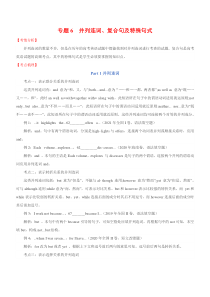 DOC
DOC
【文档说明】专题 6 并列连词、复合句及特殊句式-2023年高考英语二轮复习讲练测(上海专用)(原卷版).docx,共(15)页,36.858 KB,由envi的店铺上传
转载请保留链接:https://www.doc5u.com/view-fd598841231283e2e2b29c63c6014c54.html
以下为本文档部分文字说明:
专题6并列连词、复合句及特殊句式【考情分析】并列连词的数量不多,但是在历年的高考英语试题中都能找到对并列连词进行考查的试题。复合句是高考英语试题的高频考点,其中的特殊句式是学生必须要掌握的知识点。【考点梳理】Part1并列连词考点一:表示联合关系的并列
连词这类并列连词有:and意为“和,又,与”;both...and...意为“……和……都,两者都”;aswellas意为“既……又……,和”,此时anwellas=with=togetherwith=a
longwith,此短语所在句子中的谓语动词适用就远原则;notonly...butalso...意为“不但……而且……”,此短语所在句子中的谓语动词适用就近原则;neither...nor...意为“既不……也不……”,此短语所在句子中的谓语动词适用就近原则。这些并列连词均可连接
两个对等的并列成分。例1:...ithighlightsthe...62________offersa...(2021年全国I卷,语法填空题)解析:and。句中有两个谓语动词,分别是high-lights与
offers,连接两个动词表并列或顺接关系时,应用and。例2:Eachvolume...explores...,62_________dis-cusses...(2020年海南卷,语法填空题)解析:and。本句的主语是Eachvolume,explores与discu
sses是句子的两个谓语,连接两个并列的谓语动词应用并列连词and。考点二:表示转折关系的并列连词这类并列连词包括:but意为“但是”,不能与al-though连用;however意为“然而”;yet意为“但是,然而”,可与although连用;while意为“而
,然而”,可表示对比关系。but和however表示比较强的转折关系,而yet和while表示比较弱的转折关系。but、yet、while连接后面的成分时其后不用逗号,而however连接后面的成分时其后需加逗号
。例3:Iworknotbecause...,67_______becauseI...(2019年全国II卷,语法填空题)解析:but。本句中有两个because引导的句子,可知空格处应填并列连词,再根据句中的not可知,本空填but,构成not...b
ut结构。例4:...whenIwasseven...,forIhave...(2020年全国II卷,短文改错题)解析:for改为but或者yet。根据上下文和逗号前后两句的意思可知,逗号前后两句是转折关系。考点三:表示选择关系的并列连词这类并列连词
包括:or意为“或者,还是”,用在肯定句中,表示一种可能性;用在否定句中,引出两种或多种人与物;用在疑问句中,强调选择关系;用在祈使句中,意为“否则”。either...or...意为“或者……或者……”,强调二者中选择其一,此短语所在句
中的谓语动词适用就近原则。ratherthan...意为“而不是……”,主要用于:prefertodoAratherthandoB意为“更喜欢A而不喜欢B”;wouldratherdoAthandoB意为“宁愿做A也不愿做B”;r
atherthan其后加名词,意为“而不是……”例5:Theykept...untilit...37_______untilthey...(2020年山东卷,语法填空题)解析:or。句子中有两个until引导的句子,根据语境可
知填并列连词or,表选择关系。例6:...acup59________twoofcoffee...(2018年11月浙江卷,语法填空题)解析:or。根据上下文可知,此题填or,表示一杯或两杯咖啡。考点四:表示
因果关系的并列连词这类并列连词包括:because意为“因为”,不能与so同时使用。since意为“因为,由于,既然”。for意为“因为,由于”。so意为“所以,因此”,其后不用逗号。therefore意为“所以,因此”,其后需要加逗号。例7:Ihavemasteredthem
athematicalformula,soonceIdotheproblem,mymindgoesblank.(改错)解析:so改為but或者yet。根据句意可知逗号前后的句子表转折关系,故应把so改成but或
者yet,而不是在此处用so,表示“因此”。Part2定语从句考点一:非限制性定语从句和限制性定语从句非限制性定语从句对主句进行说明或补充,其与主句之间用逗号隔开。若把非限制性定语从句删掉,也不影响主句意思的完整性,其可用which(指物作主语或宾语)、who(指人作主语)、who
se(作定语)、whom(作宾语)等引导。限制性定语从句应紧跟定语从句的先行词,且其与主句之间不能用逗号分隔开,也不可省略掉,否则,主句意思会不完整,影响对句子意思的完整理解。根据所作句子成分的不同可用关系代词或关系副词引导限制性定语从句。例1:Whenthe...st
artedasoil-testingprogram69________gives...(2018年全国II卷,语法填空题)解析:that/which。本句中有两个谓语动词,分析句子结构可知有两套句子成分,且句子中没有逗号把从句与主句隔开,先行词是asoil-t
estingprogram指物,再结合空格处在句子中作主语可知,本空应填that或which引导限制性定语从句。例2:Thankyouforyourletter,whatreallymade...(2020年全国II卷,
短文改错题)解析:what改为which。前后两句之间有逗号隔开,此句是非限制性定语从句,先行词指物,只能用关系代词which进行引导。考点二:whose的用法whose在引导定语从句时,可引导限制性定语从句和非限制性定语从句
,在句中作定语,意为“谁的”,不但可以指“某物的”,还可指“某人的”。例3:...livedanartist61________paintingswere...(2020年全国III卷)解析:whose。先行词是anartist指人,且与paint-ings之间是所属关系,即为:an
artist’spaintings,故填whose作定语引导限制性定语从句。例4:MissZhou,_______headwasbleeding,wasquicklysenttoabighospital.解析:whose。MissZhou与head之间
是所属关系,即为:MissZhou’shead,故填whose作定语引导非限制性定语从句。注意:whose作定语,其后必须接名词,可表示为the+n.+ofwhom/which或者表示为ofwhom/whichthe
+n.結构。考点三:只能用that引导定语从句的情况先行词是little,all,everything,many,anything等时;few,all,one,much,some,no,thelast,theonly,或
形容词最高级、序数词等修饰先行词时。例5:Ieatallthefoodwhatis...(2020年全国III卷,短文改错题)解析:what改为that。当先行词被all,any,little,anything等修饰时,引导定语从句的关系代词只能用that。考点四:只能用whi
ch引导定语从句的情况在引导非限制性定语从句时,只能用which而不能用that;先行词被that修饰时,或先行词是that本身时;在介词前置的定语从句中,只能用which引导,而不能用that。例6:NowIreneworks...atthepetshop,62________sh
eopened...(2019年全国II卷)解析:which。句中有逗号把两个句子隔开,分析句子结构可知逗号后的句子为非限制性定语从句,且先行词是thepetshop,故本句应用which进行引导。考点五:介词+which/whom引导的
定语从句用“介词+which”还是用“介词+whom”引导定语从句,主要看:形容词或动词和介词的固定搭配情况;动词和先行词的固定搭配情况;介词和先行词的固定搭配情况。例7:Thegirl_______(inwhich/towhom)shespokewasmysister.解析:to
whom。本题的先行词是Thegirl指人,且speaktosb.为固定搭配,故本空填towhom。例8:Thevillage________(inwhich/fromwhom)mymotherlivesisherhometown.解析:inwhich。先行
词是Thevillage指物,且livein为固定搭配,故本题填inwhich。Part3名词性从句考点1、that,what与which的区别that引导名词性从句,只起连接作用,无词义,在从句中不充当任何成分
。what引导名词性从句时,没有选择的范围,其意义为“……的人/物/数目等”,可做从句的主语、宾语或表语。which引导名词性从句时,表示在一定的范围内进行选择,意思是“哪一个”。例1.Thatyouarecomi
ngtoLondonisthebestnewsIhaveheardthislongtime.解析:ThatyouarecomingtoLondon是that引导的主语从句,that在从句中不充当任何成分,但是
不能省略。句意为:你要来伦敦是这么久以来我听到的最好的消息。例2.Whatwecan’tgetseemsbetterthanwhatwehave.解析:Whatwecan’tget是主语从句,whatwehave是宾语从句,两个
从句都缺少宾语,所以用what来引导。句意为:我们得不到的东西似乎比我们所拥有的要好。例3.HehassomanyinterestingbooksandIdon’tknowwhichIwillchoose.解析:whichIwillchoose
充当动词know的宾语,从如此多有趣的书中选,即从一定范围内进行选择,用which来引导宾语从句。句意为:他有这么多有趣的书,我不知道我会选择哪一本。考点2、whether与if的区别二者都可作“是否”讲,都可引导及物动词的宾语从句。但下列情况通常只能用whether,不能用if:(1)引
导主语从句、表语从句和同位语从句时;(2)引导介词后的宾语从句时;(3)从句后紧跟ornot时;(4)后接不定式时(whethertodo)。例4.Whetherwe’llgocampingtomorrowdependsontheweather.解析:if不能引
导主语从句,所以用whether。句意为:我们明天是否去野营取决于天气。例5.Hedidn’tsaywhetherornothewouldstaythere.解析:动词say后面是宾语从句,但由于从句中有orn
ot,所以用whether来引导。句意为:他没有说他是否会留在那里。考点3、其他连接代词和连接副词的区别主要根据名词性从句中的具体意义,正确地选择who,which,when,where,why,how等连接词。这些连接詞
既具有疑问含义,又起连接作用,同时在从句中充当句子成分。例6.That’swhyherefusedmyinvitation.解析:why引导的从句做表语。这里之所以用why,而不是when或where等,唯一的依据便是句子的逻辑含义及语境。句意为:这就是他拒绝我
邀请的原因。例7.WhereLiBai,agreatChinesepoet,wasbornisknowntothepublic,butsomewon’tacceptit.解析:where引导主语从句,并且在从句中充当地点状语。句意为:李白,中国
一位伟大的诗人,出生的地方人人皆知,但是有些人对此并不接受。考点4、引导词that的省略that引导单个宾语从句时常常被省略,但下列情况下不能省略:(1)动词后跟有多个that引导的宾语从句时,只有第一个that可
省略,其余的不可省略;(2)用it做形式宾语的宾语从句;(3)that引导主语从句、表语从句和同位语从句时;(4)that做介词宾语时。例8.Thathesuddenlyfellilllastweekmadeussurprised.解析:Thathesuddenlyfellilllastweek是
主语从句,又因为从句中不缺主、宾语,所以只能用that引导;that不可以省略。句意为:他上周突然生病了,这让我们很吃惊。例9.Hetoldme(that)hisfatherhaddiedandthathehadtomakealivingalone.解析:told
后面有两个宾语从句,第一个that可以省略,第二个that不可省。句意为:他告诉我,他的父亲已经去世,他必须独自谋生。考点5、who/whoever,what/whatever等的区别一般说来,what/who等含特指
和疑问意义,而whatever/whoever等含泛指意义,没有疑问意义,意为“无论什么,无论谁”。例10.Parentsarewillingtobedevotedtowhateverittakestoeduc
atetheirchildren.解析:whatever引导宾语从句,并且做takes的宾语。这里的whatever不能改成what,因为句意想表达的是:“无论需要什么来教育他们的孩子”,具有泛指的概念。同时要注意,这里whatever也不能改用nom
atterwhat,因为后者只能引导状语从句。句意为:父母愿意尽一切努力教育他们的孩子。例11.Weshouldpayattentiontowhattheteacherissaying.解析:whattheteacheriss
aying是what引导的宾语从句,表示老师正在说的话,是特指。句意为:我们应该注意老师在说什么。考点6、whatever,whichever,whoever,whenever,wherever,however等与nomatterw
hat(which,who,when,where,how等)的区别前者既可以引导名词性从句,也可以引导让步状语从句,而“nomatter+疑问词”只能引导让步状语从句,两者在引导让步状语从句时可以互换。例12.Thehow-to
bookcanbeofhelptowhoeverwantstodothejob.解析:介詞to后接宾语从句,whoever引导宾语从句,同时又在从句中做主语。nomatterwho不能引导名词性从句。句意为:指南手册可以帮助
任何想做这项工作的人。考点7、“介词+who(m)引导的宾语从句”与“介词+whom”引导的定语从句的区别介词后面的引导词用主格还是宾格,取决于它在宾语从句中做主语还是宾语。例13.I’minterestedin
whowillbethewinner.解析:这是一个含宾语从句的复合句,介词in的宾语是后面整个句子,而不是宾语从句的引导词。由于引导词在宾语从句中做主语,所以要用主格who(做宾语时自然要用whom)。句意为:
我对谁将会是获胜者很感兴趣。例14.Thereare200teachersinourschool,mostofwhomarewomen.解析:这是一个“介词+关系代词”引导的定语从句,引导定语从句的是“mostof+关系代
词”,关系代词做介词of的宾语,所以要用宾格whom。句意为:我们学校有200名教师,其中大多数是女教师。考点8、名词性从句的语序名词性从句必须用陈述句语序,即使在疑问句中,从句也不倒装(而在主句上倒装)。例15.Iask
edwhetherhehadcomebackyet.解析:whetherhehadcomebackyet是动词asked的宾语,宾语从句应该用陈述句语序,不能出现问句形式。句意为:我问他是否回来了。但是在What’sthematter(trouble,wrong)...?的
句型以及疑问词在句中做主语或做定语修饰主语时,语序不变。例16.Heaskedwhatwasthematterwiththegirl.解析:What’sthematter(trouble,wrong)...?是一种固定结
构,后跟某物做宾语时,意为“某物出什么毛病了?后跟某人做宾语时,意为“某人怎么了?”what是主语,thematter(trouble,wrong)是表语。例17.Youcan’timaginehowexcitedtheywerewhentheyre
ceivedtheseniceChristmaspresents.解析:howexcitedtheywere是动词imagine的宾语从句,从句的引导词必须始终置于从句的句首,而且how和被修饰的词excited不能分开,从句不能倒装。句意为:你无法想象他们收到这些圣诞礼物时有多兴奋。考点9、
形式主语和形式宾语1.形式主语如果主语从句较长,而谓语较短时,常常将主语从句后置,用it作为形式主语,置于句首。it做形式主语的常见句型如下:(1)It+be+形容词(necessary/likely/important/certain等)+从句(2)It+be+名词(短语)(apity
/ashame/nowonder等)+从句(3)It+be+过去分词(said/told/reported等)+从句(4)It+不及物动词(seem/appear/happen/turnout等)+从句例18.Itisuncertainwhatside
effectthemedicinewillbringabout,althoughabouttwothousandpatientshavetakenit.解析:whatsideeffectthemedicinewillbringabout是主语从句,谓语是isuncertai
n,由于主语较长,谓语较短,为了避免头重脚轻,故用it做形式主语,将主语从句后置。句意为:尽管已经有大约两千名患者服用了这种药,但是它会带来什么样的副作用还不清楚。2.形式宾语宾语一般放在及物动词或介词之后,但在下列情况下,须用it做形式宾语,而将真正的宾语(常为不定
式/从句)后置。(1)动词find/feel/think/consider/make+it+宾补(形容词或名词)+不定式/从句(2)动词hate/like/dislike/appreciate+it+从句(3)动词短语seeto/dependon/relyon+it+从
句例19.Ithinkitnecessarythatwetakeplentyofboiledwatereveryday.解析:think的宾语是that引导的宾语从句,由于其后还有宾语补足语,所以用it做形式宾语,而将宾语从句后置。句意为:我认为我们每天喝大量的白开水是有必要的。请看下面例
句:Ishallseetoitthatheistakengoodcareofwhenyouareabsent.你不在的时候,我负责把他照顾好。Iwillappreciateitifyouinvitemetodinner.如果你邀请我共进晚餐,我会很感激的。Ihateitwhenpeople
askmeformoney.我不喜欢别人向我要钱。Part4状语从句状语从句指句子用作状语时,起副词作用的句子。它可以修饰谓语、非谓语动词、定语、状语或整个句子。根据其作用可分为时间、地点、原因、条件、目的、结果、让步、方式和比较
等从句。[时间状语从句]高考对时间状语从句是常放在特定的句型结构中考查的,要点主要涉及的是引导词的选择和运用。常考的句型结构有:1.由assoonas,immediately,directly,instantly,themoment,theinst
ant,theminute等引导的时间状语从句。这些连词和短语都表示“一……就”。2.由bythetime引导的时间状语从句。注意时态的变化:在一般情况下,如果从句的谓语动词用一般过去时,主句的谓语动词用过去完成时;如果主句的谓语动词用一般现在时,主句的谓语动词用将来完成时。3.
由eachtime,everytime和whenever引导的时间状语从句。4.由before引导的时间状语从句。before的本意为“在……之前”,根据具体语境还可理解为“还没来得及/还没有……就……”“趁着还没……就……”“不知不觉就……”“……,才……”等。5.hardly
(scarcely,rarely)...when,nosooner...than相当于assoonas之意。主句用过去完成时,从句用一般过去时。当hardly,scarcely,rarely和nosooner位于句首时,主句应
用倒装语序。例1Theladywasabouttosaysomething_________herhusbandsignedhertokeepsilent.解析when。句意:那位女士刚想讲话她的丈夫便打手势让她保持沉默。例2_________theyhadbeen
warnedofthepossiblesnowstormathand,theydeterminedtostayathomefortheholiday.解析After。句意:得到告诫可能有暴风雪即将到来,他们决定假期待在家里。[地点状
语从句]地点状语从句由where,wherever引导。where指“在某个地方”,wherever指“无论哪里,在任何一个地方”。使用时,一要注意两者的含义区别,二要注意地点状语从句和定语从句的区别——where引导定语从句时,从句前应有一个表示地点的名词作先行词,而状语从句前则无需先行词
。如:Gobackwhereyoucamefrom.你从何处来到何处去。Gobacktotheplacewhereyoucamefrom.回到你来的那个村子里去。例3Thechildwastoldtorema
in_________hegotlostsothathecouldbefoundeasily.解析where。考查where引导的地点状语从句。句意:那个孩子被告知待在他迷路的地方,这样就很容易找到他了。例4Withaspecialtrainticketyo
ucantravel_________youlikeinEuropeforjustover£100.解析wherever/anywhere/everywhere。句意:你如持有专车票,仅花一百多一点英镑,就可以到欧洲各地旅行。[让步状语从句]引导让步状语从句的连词有though/althou
gh,evenif/eventhough,nomatterhow/what/when/which/who/where,however/whatever/whenever/whichever/whoever/wherever,while等。其中,althou
gh与though可互换,都可以与yet,still或nevertheless连用,但不能和but连用;however引导让步状语从句时后紧跟形容词或副词;while引导让步状语从句,常置于句首;as引导让步状语从句中时必须
要倒装。例5_________,healwaystriedtoavoidme,pretendingnottohaveseenmeatall.解析Whenever。考查whenever引導让步状语从句。句意:
不管什么时候我接近他,他总试图躲避,假装根本就没看见我。[状语从句中的省略]在状语从句中,为了使语言更加简洁生动,经常使用省略的形式。状语从句中的省略原则:1.在时间状语、条件状语、让步状语、方式状语从句中,当从句与主句的主语一致时且从句中含有be动词的
某种形式时,可以省略状语从句的主语和系动词be,这时从句中可出现如下结构:连词+名词/形容词/介词短语/动词-ing形式/过去分词/不定式等;2.当状语从句中主语是it,谓语动词是系动词be时,则通常可省去主语it及系动词be;3.在if引导非真
实条件状语从句中,谓语包含were/had/should时可省略if,并将were/had/should移到句首,构成倒装句。[状语从句的时态]1.在时间和条件状语从句中,若主句用一般将来时,从句则用一般现在时代替将来;endprint2.since引导
时间状语从句时,从句用一般过去式,主句用现在完成时;3.特殊状语从句的时态,在hardly...when...,scarcely...when...,nosooner...than...表示“一……就……”句式中主句用过去完成时,从句用一般过去式。[状语从句中
的倒装]含有状语从句的复合句中主句的倒装,有下列情况:1.nosooner...than...,hardly...when...,scarcely...when...引导时间状语从句,当nosooner,hardly,scarcely位
于句首时,主句要用部分倒装语序,且主句常用过去完成时。2.“否定词+从句”放在句首时,主句要倒装。3.“only+状语从句”置于主句之前时,主句要倒装。4.as,though引导让步状语从句,常将作表语的形容词
、名词或动词置于句首,构成的部分倒装,若表语是可数名词,前置时要省略冠词a或an。5.在so...that...,such...that...引导的结果状语从句中,如果将“so+形容词”“such+名词”置于句首,前部分用部分倒装语序。[状语从句中的虚拟语
气]1.if引导的非真实条件句中,如果表达与事实相反的情况,则要用虚拟语气。与过去事实相反的假设,从句的谓语动词用“had+过去分词”,主句用“should/would/could/might+have+过去分词”。如:IfIhadknownIwouldmeet
suchabigtrouble,Imightnotliveherenow.如果我早知道我会遇到这么大的麻烦,我可能现在就不会住在这里了。与现在事实相反的假设,从句的谓语动词用过去式,系动词用were,主句的谓语用“should/would/could/might+动词原形”;与将来事实相反的假设,
结构为:从句的谓语动词用“should/wereto+动词原形”,主句用“should/would/could/might+动词原形”。2.在asif引导的方式状语从句中,如果表达的是真实情况,則用陈述语气;如表达的是假设或无
法实现。asif引导的虚拟语气包含以下几种情况:与现在事实相反,用一般过去时;与过去事实相反,用过去完成时;与将来事实相反,用“would/could/might+动词原形”。Everythinginmychildhoodcrowdedinmymindasiftheyhadj
usthappened.童年发生的一切都挤在我的脑海中,仿佛就像刚刚发生的一样。【对点训练】单项选择1.Thetwomenfromthetruckwerepoorlydressedandspokein________so
undedlikeaneasternEuropeanlanguage.A.whichB.thatC.whatD.where2.Sometimesadvertisementsmakeitpossibleforcompaniestosellthecusto
mermoneycannotbuy.A.whatB.whichC.thatD.whether3.Thereason________hewassleepyinclasswas________hestayeduplastnight.A.that
,thatB.why,howC.which,whetherD.why,that4.Thequestiondiscussedatthemeetingwas________itwasworthtrying.A.whetherB.whyC.thatD.how5.Theproblemwas________
__noneofthesefuturistswerescientistsorengineers.A.whetherB.whichC.thatD.what6.__________rolehewillplayinthefilmhasn’tbeenknown.A.WhicheverB.What
everC.WhichD.What7.Lookattheinkwashpainting________ourbossspentagreatfortune.Isn’titbreath-taking?A.thatB.whichC.forwhatD.onwhich8.
Ascanbeseenbythelakeside,betweenthetwohills________atallmedievalcastle________magnificencecannotbeneglected.A.lies;whoseB.lie;whichC.lies;ofw
hichD.lie;uponwhich9.SophiaScottstartedafreetutoringservicetohelpanyone________haddifficultycatchingup.A.whoseB.thatC.whomD.who10.Itisontheoccas
ions________wedon’trealizethosetalkingtousarestealthmarketers________theyarepaidtoadvertisesomeproductstous.A.that;whichB.which;whenC.w
here;thatD.when;that11.________wecantalkopenlyaboutthisemergentissue,wewon’tbeabletomakeanyprogress.A.SinceB.UnlessC.Whether
D.Whatever12.Muchtotheteacher’ssurprise,Johnisoftenmistaken________othersarecorrect,smartthoughheis.A.in
whichB.thatC.whereD.what13.Theislandershadn’tgotwellprepared________theywererequiredtorelocatetoanearbyisland.Infact,itisonlytwoort
hreeyears________someislandersmovedhere.A.since;afterB.before;sinceC.until;thatD.after;before14.Nomatterhowfrequently________intheLouvreinParis,
themasterpiecesofPabloPicassoalwaysattractalargenumberofaudience.A.displayB.displayedC.displaysD.aredisplayed15.Inthesouthoftheriver_______
_.A.asmallfactorylayB.didasmallfactorylieC.liesasmallfactoryD.doesasmallfactorylie16.Thepilotsuddenlycouldnotco
ntroltheplaneand________.A.downfromtheskyfellitB.downfromtheskyitfellC.downfromtheskydiditfallD.fellitdownfromthesk
y17.Onlywhenyouhavecontractedthevirus________thecorrectnessofadvicethat,unlessyouarestrongenoughtogetoveritofyourself,you________b
evaccinated.A.youwillrecognize;needtoB.willyourecognize;aretoC.youwillrecognize;mustD.willyourecognize;should18._____onthelastday_____hefinallyhan
dedinthedocuments.A.Itwas,whenB.Itwas,thatC.Therewas,howD.Therewas,where19.Though________toseeus,theprofessorgaveusawarmwelcome.A.surprisingB.was
surpriseC.beingsurprisedD.surprised20.It’snotwhatyouthinkbutwhatyoudo________counts.A.whatB.whichC.asD.that单句语法填空21.OnceMichaelJordansaid“Ica
nacceptfailure;everyonefailsatsomething,________Ican’tacceptnottrying.’’22.Shewasabouttogotobed_______thetelephonenumberrang.23.
Duringyourlifejourney,somepeopleyoumeetmayletyoudown______morewillhelpyougrow.24.Ihadn’trealizedshewasMissLiu______
____shespoke.25.Itwasnot________hiswifecamebackthathewenttobed.26.Weneedtothankthegreatmenofthepastfortheirwisdom,_________“alltruthsareeasyt
ounderstandoncetheyarediscovered”.27.Itremainstobeseen_______weather-trackingsystemcanpreventmanydisa
sters.28.On18April1955,itwasreported_______Einsteinhadpassedaway.29.Somepeople’sopinion_______advancesintec
hnologywereunnecessaryisnonsense.30.Manyscientistssubscribetotheview________itishumanactivitythathas
causedglobalwarming.31.Getup,showupandnevergiveup!That’s__________weshoulddo.32.Myquestionis_______Einsteinwasstilllovedbyhisfri
endsandneighboursevenifhewasforgetful.33.Canyousharewithus_______impressedyoumostaboutthemovie?34.Iaskedalady___
_____theshoesectionwas.35.Theman______isshakinghandswiththeexpertismyfather.36.I’dliketojointhemusicclub______whichIcansingin
abandandplaytheguitar.37.Heliedtousthathehadnoparents,________wonourmercyonhim.38.Itwon’tbelong________weworkout
awaytoovercomethedifficulties.39.Thoughitis5years________heretiredfromhisworkplace,theoldprofessorremainsactivein
theacademiccircles.40.Theyoungladyrushedintotheroom_______________(instant)sheheardthenoise.41.Itishistirelesseffortsthatbroughthim__
______________heisnow.42.Itmusthaverainedlastnight,______thegroundiswet.43.Leaveyourkeywithyourneighbor__________caseyoulockyourselfoutoned
ay.44.Iwassoangry________Iavoidedherduringschoolallday.45.Youwilllosetheabilitytofocusafteroneortwonights__________youcansleep
well.46.________youstarteatinginahealthierway,weightcontrolwillbecomemucheasier.47.Hard_________theytried,theycouldn’tmak
eherchangehermind.48.Nomatter______happens,shealwaystriestolookonthebrightside.49.Inbrief,do________theChinesedow
heninChina.50.Thoughheis3yearsyounger_______me,heissenior_______meinthecompany.51.Seatedinthefirstrow________(be)som
eadvancedworkers.52.Buthere________(come)aproblem;shouldweclonehumans?53.While________(wait)fortheopportunitytoget________(
promote),Henrydidhisbesttoperformhisduty.54.Somemedicine,ifwrongly______(take),cankillaperson.55.Itisthecombinationo
fhumourwithmoreseriousmessages________makesMarkTwain’swritingfunnyandoftenmischievous.56.Itwasnotuntilyesterday________Iknewmysister
wasadmittedtoakeyuniversity.57.Itisonlythoselovedbyothers________canlearnhowtoloveothers.58.________(be)honest,Iwassurpr
isedheknewwhereIwas—Imovedsooften.59.________(be)frank,Ireallydon’ttakeanyinterestinplayingfootball.60.________(tell)thetruth,wehavenotime________
(waste)nowwheninSenior2.【上海高考真题及模拟试题精选】语法填空A(2022·上海·模拟预测)Directions:Afterreadingthepassagebelow,fillintheblankstomakethepassagecoherentandgrammatic
allycorrect.Fortheblankswithagivenword,fillineachblankwiththeproperformofthegivenword;fortheotherblanks,useonewordthatb
estfitseachblank.Weoftenthinkofdrawingassomethingthattakesinborntalent,____1____thiskindofthinkingstemsfromourmisclassificationofdrawingas,pr
imarily,anartformratherthanatoolforlearning.Researchers,teachers,andartistsarestartingtoseehowdrawingcanpositivelyimp
actawidevarietyofskillsanddisciplines.Mostofushavespentsometimedrawingbefore,butatsomepoint,mostofusstopdrawing.Therearepeop
lewhodon’t,obviously,andthankGodforthat:aworld____2____designersandartistswouldbeaveryshabbyoneindeed.Somearguethatsomanyadul
tshaveabandoneddrawingbecausewe’vemiscategorizeditandgivenitaverynarrowdefinition.Inhisbook,StickFigures:Drawingasa
HumanPractice,ProfessorD.B.Dowdarguesthat“Wehavemisfiledthesignificanceofdrawingbecauseweseeitasaprofessional
skill____3____apersonalcapacity.We____4____(mistake)thinkof“good”drawingsasthosewhichworkasrecreationsoftherealworld,asrealisticillusions.
Rather,drawingshouldberecategorizedasasymbolictool.”Humanbeingshavebeendrawingfor73,000years.It’spartofwhatitmeanstobehuman.Wedon’thavethestre
ngthofchimpanzeesbecausewe’vegivenupanimalstrengthtomanipulatesubtleinstruments,likehammers,spears,and—later—pensandpencils.
Thehumanhandisanextremelydensenetworkofnerveendings.Inmanyways,humanbeingsarebuilt____5____(draw).Someresearchersarguethatdoodling
activatesthebrain’sso-calleddefaultcircuit—essentially,theareasofthebrainresponsibleformaintainingabasel
inelevelofactivityintheabsenceofotherstimuli.Becauseofthis,somebelievethatdoodlingduringaboringlecturecanhelpstudentspayattention.Inon
estudy,participantswereaskedtolistentoalistofnames____6____eitherdoodlingorsittingstill.Thosewhoremember
ed29percentmoreofthenamesthanthosewhodidnot.There’salsoevidence____7____drawingtalentisbasedonhowaccuratelysomeoneperceivestheworld.Thehumanvisu
alsystemtendstomisjudgesize,shape,color,andanglesbutartistsperceivethesequalities____8____(accuracy)thannon-artists.Cultivatingdrawingtalentcanbeco
meanessentialtooltoimprovepeople’s____9____(observe)skillsinfieldswherethevisualisimportant.Ratherthanthinkofdrawingas
atalentthatsomecreativepeoplearegiftedin,weshouldconsideritasatoolforseeingandunderstandingtheworldbetter-onethatjustsohappen
stodoubleasanartfrom.Bothabsent-mindeddoodlingandcopyingfromlifehavebeenshowntopositivelyaffectyourmemoryandvisualperception,socomplainlo
udlythenexttimeyourschoolboard_____10_____(slash)theartdepartment’sbudget.B(2022·上海杨浦·二模)Directions:Afterreadingthepass
agebelow,fillintheblankstomakethepassagecoherentandgrammaticallycorrect.Fortheblankswithagivenword,fillineachblankwiththe
properformofthegivenword;fortheotherblanks,useonewordthatbestfitseachblank.Thefact_____11_____humanslivelongerthaneverbeforecutsbothw
ays,becausethemoretimewespendontheplanet,themorethingscangodisorderedinourbodiesandourminds.It'saparticularchallengeforneur
ologists_____12_____wanttokeepourbrainshealthy.Fordecades,theyhaveworkedtocreatedrugstoprevent,delayortreatcognitivedeclineinthe5millionolderA
mericanswholivewithdementia.Amiraclepillremainselusive—butresearchers_____13_____(make)progressinunderstandingnon-pharmacologicalstrategiesthatmigh
tkeepthebrainalertand_____14_____(work)atclosetoitsyoungerpace.Sofar,theyhaveidentifiedsocialengagementandlearningnewthingsasactiviti
esthat_____15_____slowordelaycognitivedeclineandAlzheimer's.Noteverykindofinterferenceworksthesame,ands
omepreviousresearchaboutthemhasbeenuneven.Butinthemostrigorousstudytodate,researcherspitteddifferenttypesofcognitivetraininghead-to-hea
dandconcludedthatonestrategyinparticular—akindofcomputerizedbraintrainingthathelpsthemindtoprocessinformati
on_____16_____(quickly)—cansignificantlylowerratesofcognitiveanddementia.Thestudy,ledbyJerriEdwardfrom
theUniversityofSouthFlorida,involvednearly3,000healthyolderpeopleinafive-weektrainingprogram.Theyweredistributedrandomlyt
o_____17_____nointervention(干预)oroneofthreetracks:improvingmemoryskills;boostingreasoningskills;andacomput
erizedprogramthatfocusedonprocessingspeed.Afterfiveweeks,participantswerefollowedoverthecourseof10years.Attheendofthestudy,onlythose_____18__
___(assign)tothespeed-processingtrainingshowedimprovement._____19_____theyhadonlydonefiveweeksofbraintraining,thee
ffectwasdramatic:thatgroupsawa33%reductionintheamountofdementiaorcognitiveimpairmentafter10yearscomparedwiththosewhoreceivednotraining.Theresea
rcherssuspectthattrainingthebrainasyouwouldamuscle—toworkasefficientlyaspossible—iswhat's____20____play.